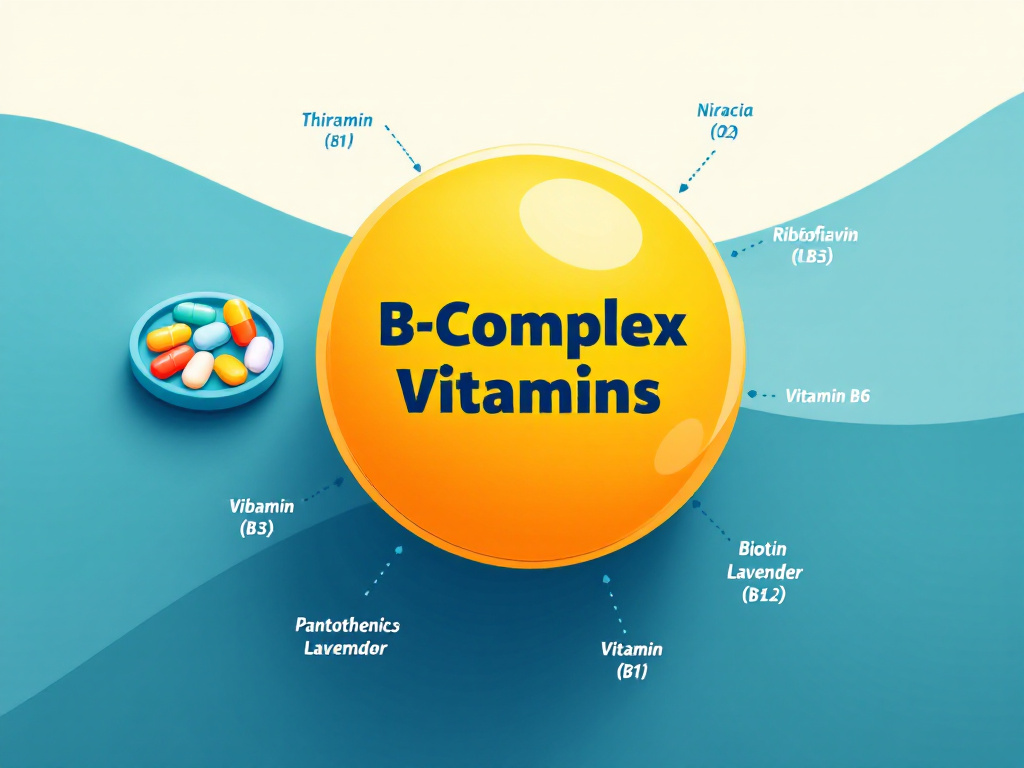B-complex vitamins are a group of eight essential nutrients that play a vital role in keeping your body energized, your mind sharp, and your overall health in check. These water-soluble vitamins are fundamental to our physiological processes, working synergistically to support various bodily functions from energy production to maintaining neurological health.
What Are B-Complex Vitamins?
B-complex vitamins are a group of water-soluble vitamins that include:
- B1 (Thiamine)
- B2 (Riboflavin)
- B3 (Niacin)
- B5 (Pantothenic Acid)
- B6 (Pyridoxine)
- B7 (Biotin)
- B9 (Folate)
- B12 (Cobalamin)
Since these vitamins are water-soluble, your body doesn’t store them, making it essential to replenish them daily through diet or supplements. They work together harmoniously to support metabolism, energy production, and overall health.
Comprehensive Benefits of B-Complex Vitamins
Key Functions and Benefits:
- Energy Metabolism: B vitamins are crucial in converting food into energy, with thiamine, riboflavin, niacin, pantothenic acid, and B6 all contributing to energy production through metabolism of carbohydrates, fats, and proteins.
- Brain Function: B6, B9, and B12 are vital for cognitive health, producing neurotransmitters like serotonin and dopamine that regulate mood, sleep, and appetite.
- Blood Health: Folate and B12 are essential for red blood cell formation and preventing anemia.
- DNA Synthesis: Folate plays a crucial role in cell division and growth through nucleic acid synthesis.
- Heart Health: B6, B9, and B12 help reduce homocysteine levels, protecting against heart disease.
Comprehensive Guide to B-Complex Vitamins
| Vitamin | Role | Benefits | Food Sources |
|---|---|---|---|
| B1 (Thiamine) | Converts food into energy, supports nerve function. | Boosts energy levels, maintains nervous system health. | Whole grains, pork, beans, nuts, fortified cereals. |
| B2 (Riboflavin) | Supports cellular energy production and metabolism. | Promotes healthy skin, eyes, and nervous system. | Dairy products, eggs, leafy greens, almonds, fortified cereals. |
| B3 (Niacin) | Helps metabolize fats and carbohydrates. | Supports brain function, helps lower cholesterol. | Meat, fish, peanuts, whole grains, legumes. |
| B5 (Pantothenic Acid) | Essential for fatty acid synthesis and energy metabolism. | Promotes healthy skin and hair, aids in wound healing. | Chicken, avocados, mushrooms, eggs, whole grains. |
| B6 (Pyridoxine) | Involved in amino acid metabolism and neurotransmitter production. | Supports brain health, reduces PMS symptoms, aids in hormone regulation. | Chickpeas, bananas, potatoes, salmon, poultry. |
| B7 (Biotin) | Supports fat and carbohydrate metabolism. | Strengthens hair, skin, and nails, supports cellular energy. | Eggs, nuts, seeds, sweet potatoes, avocados. |
| B9 (Folate) | Essential for DNA synthesis, cell division, and fetal development. | Prevents birth defects, supports red blood cell formation, aids in tissue growth. | Leafy greens, legumes, citrus fruits, fortified grains. |
| B12 (Cobalamin) | Supports red blood cell formation and neurological function. | Boosts energy, supports brain function, prevents anemia, aids in DNA synthesis. | Meat, fish, dairy, eggs, fortified plant-based foods. |
Signs of B-Vitamin Deficiency
Common Deficiency Symptoms:
- Physical Fatigue: Due to impaired energy production
- Anemia: From insufficient B12 or folate levels
- Skin Issues: Including dermatitis or unusual hair loss
- Neurological Symptoms: Such as memory problems, depression, or peripheral neuropathy
- Digestive Issues: Including poor appetite or digestive disturbances
Who Needs B-Complex Supplements?
While a balanced diet can provide adequate B vitamins for most people, certain groups may need supplementation:
- Vegetarians and Vegans: Especially for B12, which is primarily found in animal products.
- Older Adults: Due to decreased absorption capacity with age, particularly for B12.
- Pregnant Women: Increased needs for folate and other B vitamins during pregnancy.
- People with Digestive Disorders: Conditions like celiac disease or Crohn’s can impair nutrient absorption.
- Regular Alcohol Users: Alcohol can deplete B vitamin levels in the body.
- Those Taking Certain Medications: Some medications can interfere with B vitamin absorption.
Conclusion
B-complex vitamins are essential nutrients that support everything from energy production to brain function and heart health. While a balanced diet rich in whole foods is the best way to obtain these vitamins, certain individuals may benefit from supplementation. Understanding your individual needs and working with healthcare providers can help ensure optimal B-vitamin levels for overall health and well-being.
Share your experience with B vitamins in the comments below!
Subscribe for more evidence-based health and wellness information.




